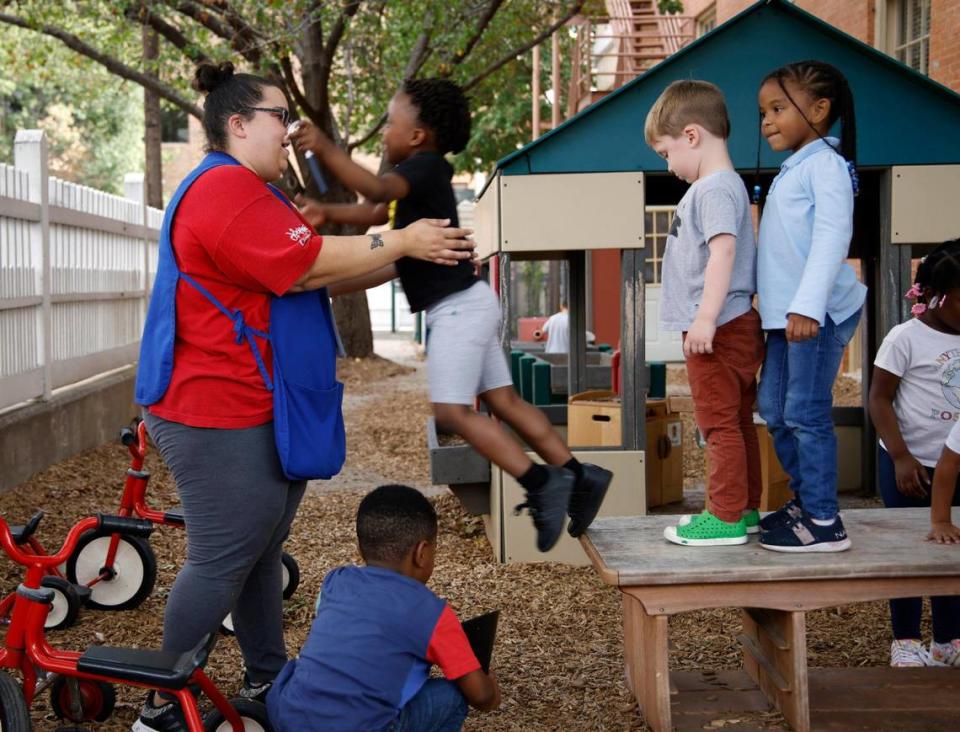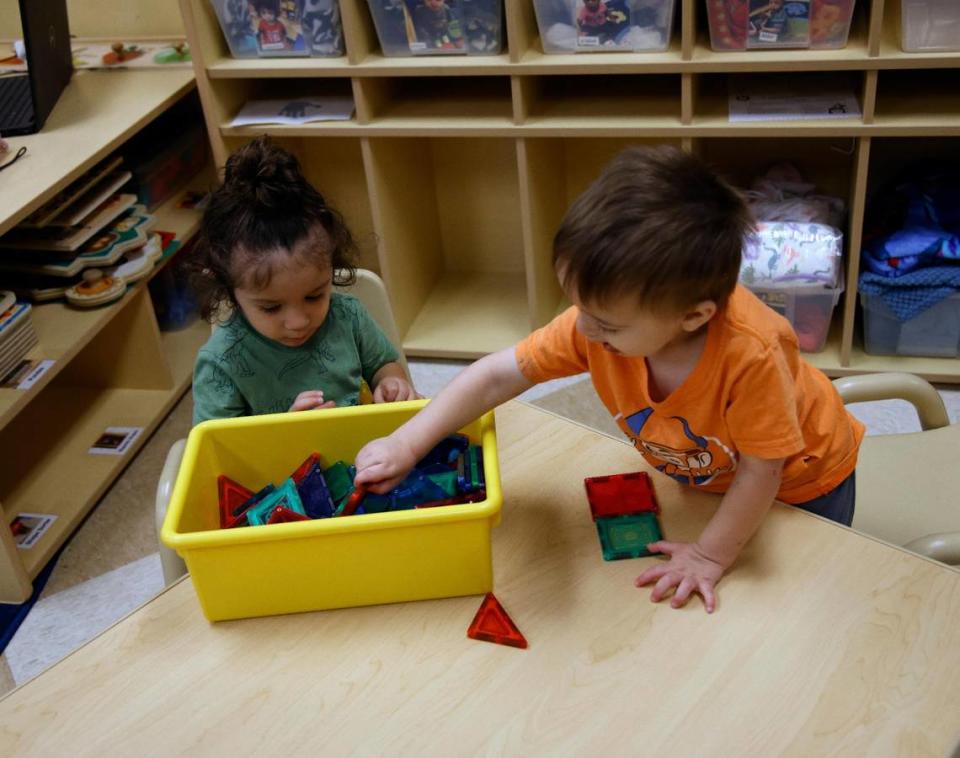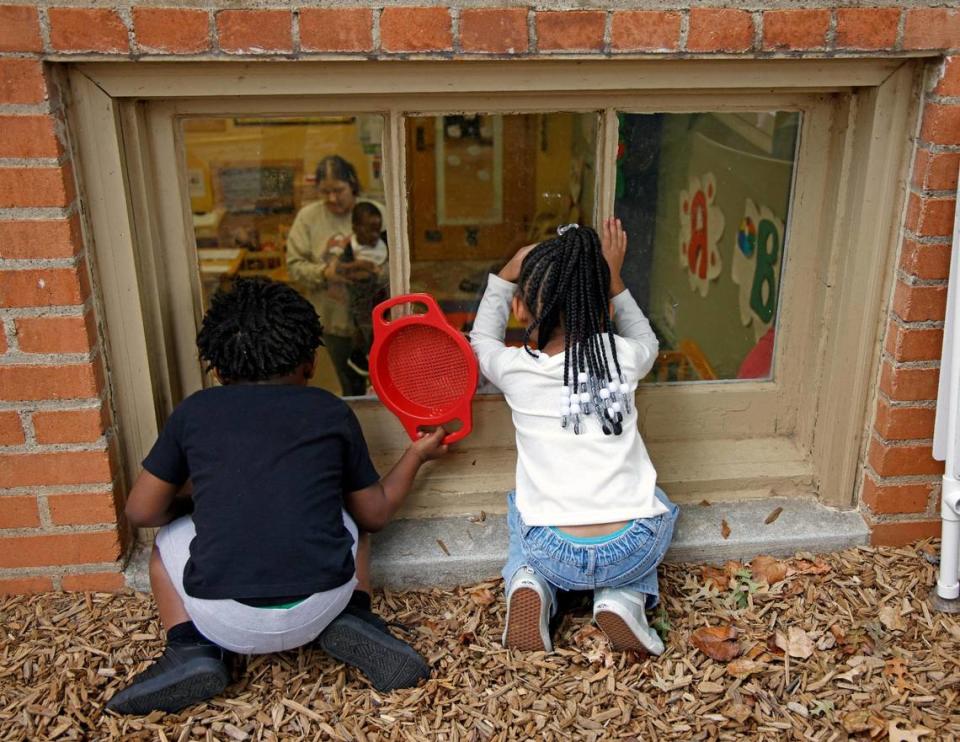Fort Worth area child care providers grapple with finances as federal dollars expire soon
The fate of Tarrant County’s child care sector hangs in limbo as child care providers navigate the incoming loss of federal funds that helped keep them afloat during the COVID-19 pandemic.
A national report by the Century Foundation — a progressive think tank that conducts research and strives for equity solutions in education, health care and work — shows that 3.2 million children could lose their child care spots as a result of more than 70,000 programs closing. Texas is expected to take the biggest hit nationwide, after New York, in terms of the number of children expected to lose child care: 305,967.
Although the report focuses on American Rescue Plan stabilization funds, the child care sector also received federal funding through the Coronavirus Aid, Relief and Economic Security Act and the Coronavirus Response and Relief Supplemental Appropriations Act. These historic and unprecedented programs, which end on Sept. 30, provided $37.5 billion that kept child care centers open, helped programs retain early childhood educators, provided parents with relief from tuition and copayments, and subsidized the ongoing cost of cleaning and sanitation.
The ARPA stabilization funds were the largest federal investment in child care in U.S. history at $24 billion, according to the Century Foundation. Texas received $2.7 billion and its child care centers have received an average of $303,500, according to the federal Administration for Children and Families. Family child care homes have received an average of $24,900.
Additionally, the Texas Workforce Commission infused an additional $1 billion in COVID stimulus funds toward the child care sector, which providers must spend by the end of November.

Funding loss may have dire effects in Tarrant County
In Tarrant County, it remains to be seen how hard of a hit child care providers will soon bear, but predictions paint a grim picture of parents being forced to quit their jobs to stay at home with their children, creating a domino effect that impacts their child’s development and the local economy.
“That’s going to leave a shortage in the workforce. That’s going to lead to more families experiencing crisis, poverty and potential homelessness,” said Carlye McQuiston, chief program officer at the Center for Transforming Lives, which provides early childhood education and other services aimed at breaking the cycle of poverty for women and their children.
“If those children aren’t getting high-quality early childhood education, what does that mean for how they’re going to have a trajectory in school?... What does that mean for their ability to graduate?” McQuiston added. “I think it’s not only going to be an immediate impact, it’s going to be a long-term impact.”
The Center for Transforming Lives, which operates four of its own centers and partners with an additional six, is in the midst of seeking private funds to fill in the gaps that will be left from the public funding going away, McQuiston said. The organization has used it toward personnel costs, infrastructure needs and personal protective equipment for its staff and children.
Since April 2022, the Center for Transforming Lives’ four centers have received about $1.94 million total, according to Communications Director Matthew Marchbanks. Its Arlington Child Development Center received the most at $1.02 million, followed by its Rosie K. Mauk Child Development Center in downtown Fort Worth with just over $634,000.
The amount determined for each center was based on its size and state rating, and the last round of funding came in June, Marchbanks said. The organization, which currently serves more than 600 infants, toddlers and preschoolers, has until Nov. 30 to spend it.

‘We have to have the resources’
On Wednesday afternoon at the Rosie K. Mauk Child Development Center, a class of 3- to 4-year-olds enjoyed the playground, one; child riding a tricycle and another collecting leaves in a white funnel. Santana Porter, a mentor coach who helps early educators with lesson plans and classroom management goals, reflected on her past three years with the Center for Transforming Lives as the children basked in the sub-85 degree, overcast weather.
When Porter joined in fall 2020, classroom management wasn’t a huge obstacle since enrollment was down and class sizes were small, she said. Now, as enrollment continues to grow, the development impacts from the children staying at home during the pandemic are beginning to manifest through their behavior, which includes resisting attempts at establishing a routine.
More children also means more resources will be needed to allow them to have different options for learning and discovery, in addition to meeting basic needs, Porter added.
“We provide formula. We provide diapers. We provide wipes. We’re providing their lunch, their snacks, their breakfast,” Porter said. “We have to have the resources for the children because when children don’t have a choice, that behavior tends to go up.”

Meanwhile, across the street from the Rosie K. Mauk Child Development Center, the YMCA of Metropolitan Fort Worth faces the same financial obstacles with its own child care services at the Ella McFadden Early Childhood Learning Center.
The center accommodates about 88 children ages 18 months to 5 years and is open from 7 a.m. to 6 p.m., said Program Director Mechell Green. About 75-80% of enrolled children stay from open to close while parents work or navigate school schedules for their older children.
“I think people realized how important early childhood was (when COVID hit),” Green said. “The staff are early educators. Sometimes people will use the word ‘babysit,’ but we are so much more than that. We educate our children. We make sure that when our children leave here, they are truly ready to be funneled into the school district.”
The center is committed to maintaining its level of service, but it’s a work in progress in regards to how that will be achieved.
“I’m not going to lie, it will be a struggle,” Green said. “But our commitment is to our families and to the community, so we’re going to do everything we have to do and be very creative to make sure we keep everything going (and) don’t have to pass this on to our parents.”
Public investment needed, early educator says
Tarrant County fared better than most urban areas across the state amid the pandemic with a higher percentage of child care programs remaining open, partly because of the area’s strong network of programs and professionals who rallied together, said Bethany Edwards, director of the Early Learning Alliance. But the community will not be immune to what’s coming.
“At this point, we are still preparing for the inevitable. I don’t think we have seen necessarily the kind of fallout from this ending in public funding quite yet,” Edwards said.

The bigger issue is the sector’s shaky system that was apparent before COVID-19 hit, underscored by the high turnover of early educators who make a median wage of $13.22 per hour while rarely receiving benefits, Edwards said. Providers typically have limited revenue to stay in business while paying these wages.
As a result, a shift is needed in how the nation views early education, as it is as much of a public good as kindergarten through 12th grade, Edwards added.
“I do believe that we need increased public investment. It probably won’t be a fully universal system, like we see in other countries, but we’re having all of these efforts to try to sustain the industry, both for providers and for parents, (while) we’re really just kind of nickel and dime-ing out,” Edwards said. “We’re putting a Band-Aid over a gushing wound when we have these smaller efforts to try to prop up the industry. Nothing is going to really systemically change until we have consistent public funding.”

